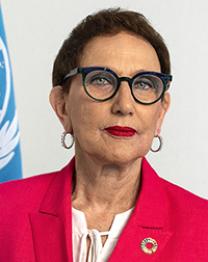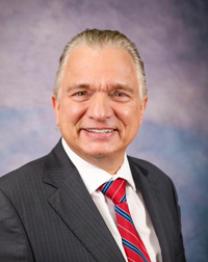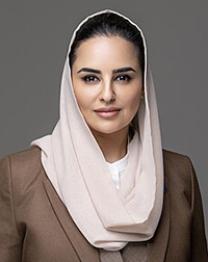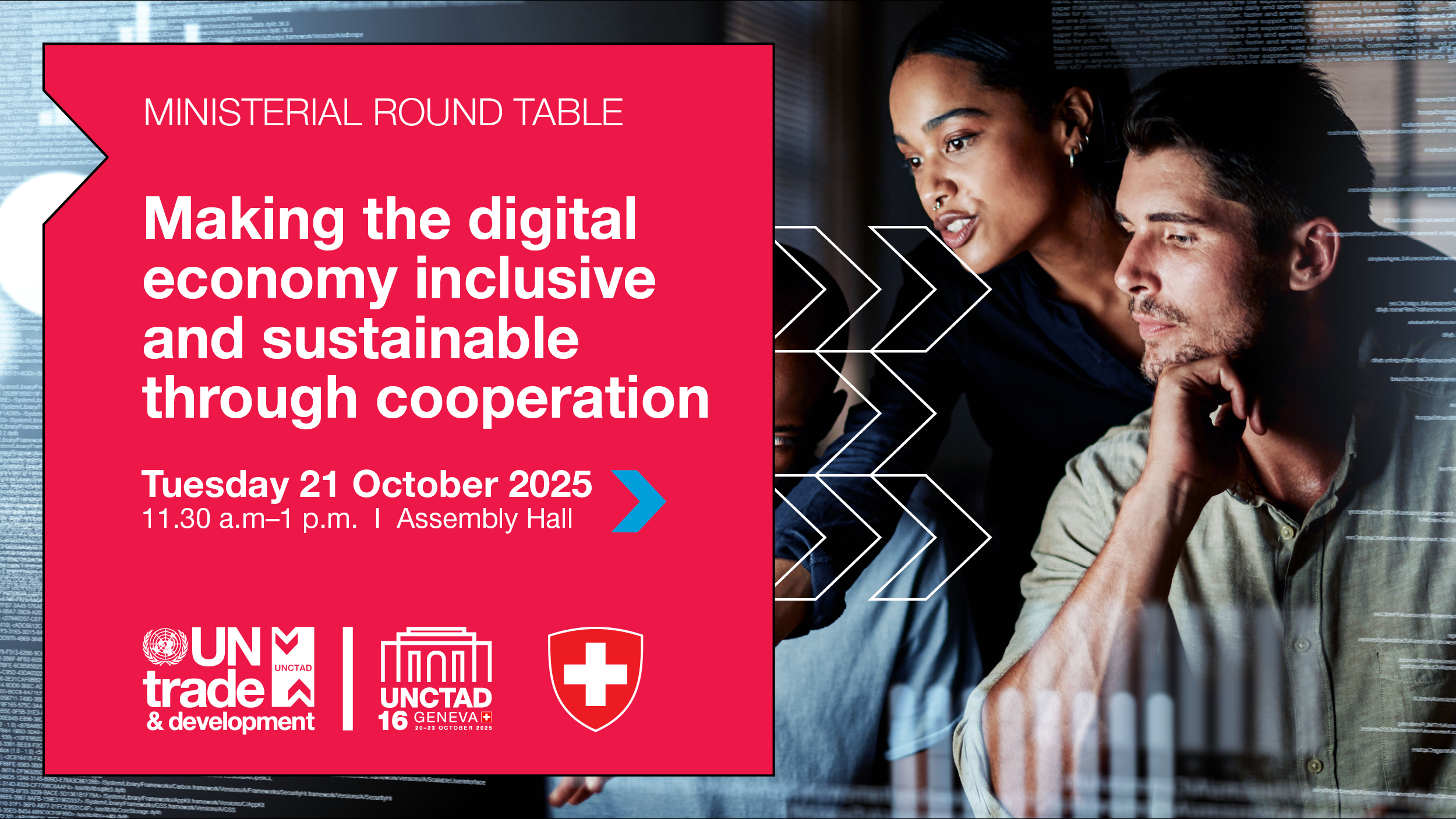
Digitalization is evolving at a high speed, reshaping economies, trade and development paths. Digitalization offers significant opportunities related to innovation, efficiency and new business models, yet is also deepening existing divides in access to digital technologies and data and in digital capabilities. At the same time, the environmental footprint of digital growth is coming under increased scrutiny. UNCTAD is influencing related policy debates. Its work on data governance contributed to the decision by Member States to establish a dedicated working group under the Commission on Science and Technology for Development. UNCTAD is also co-leading the implementation of the Global Digital Compact in the areas of inclusive digital economy and data governance. In addition, in 2025, UNCTAD is the chair of the United Nations Group on the Information Society.
Discussions at this round table explored how to ensure that the evolving digital economy becomes a driver of both inclusiveness and sustainability. Critical policy options and cooperation mechanisms at the national, regional and international levels were examined. In addition, discussions considered how UNCTAD and partners can support countries in building resilient digital ecosystems that bridge divides, improve data governance, promote innovation and foster greater circularity.
Watch the ministerial roundtable on the digital economy:
Programme
Opening remarks: Rebeca Grynspan, Secretary-General, UNCTAD
Panel 1: Digitalization challenges and harnessing benefits from digital trade
Questions
- What are the pressing challenges of rapid digitalization with regard to inclusion and sustainable outcomes that need to be addressed?
- What should be done to enable developing countries to benefit more from data, electronic commerce and digital trade?
Speakers
- Arnoldo André Tinoco, Minister of Foreign Affairs, Costa Rica
- Arrmanatha Christiawan Nasir, Vice Minister for Foreign Affairs, Indonesia
- Ana Isabel Xavier, Secretary of State for Foreign Affairs and Cooperation, Portugal
- Deemah AlYahya, Secretary General, Digital Cooperation Organization
Panel 2: Global support and digital cooperation
Questions
- What kind of international support is needed to ensure that digitalization brings benefits for all and contributes to protecting the planet?
- How can the implementation of the Global Digital Compact, as well as the 20-year review of the implementation of the outcomes of the World Summit on the Information Society, advance global digital cooperation?
Speakers
- Majid bin Abdullah Al-Kassabi, Minister of Commerce, Saudi Arabia
- Mthuli Ncube, Minister of Finance, Economic Development and Investment Promotion, Zimbabwe
- Deborah Rivas Saavedra, Vice Minister of International Trade and Foreign Investment, Cuba
- Angeline Tham, Founder and CEO, Angkas, and UNCTAD eTrade for Women Advocate for South-East Asia and the Pacific
Moderator: Isabelle Kumar, Journalist and Professional Moderator
Format: Davos-style
In September 2021, Rebeca Grynspan was appointed Secretary-General of the United Nations Conference on Trade and Development (UNCTAD), becoming the first woman to lead the organization in its 60-year history.
Rebeca Grynspan, an economist and former Vice President of Costa Rica, is an experienced leader of international institutions with a substantive track record in government, UN diplomacy, economic policy and multilateral cooperation at the global level.
Prior to joining the United Nations, she was Vice President of Costa Rica and held cabinet positions as Minister of Housing, Minister Coordinator of Economic and Social Affairs and Deputy Finance Minister.
Previously, she served as Secretary-General of the Ibero-American Conference (2014–2021), chairing regional summits of Heads of State and Government; United Nations Under-Secretary-General and Associate Administrator of the United Nations Development Programme (UNDP); and UNDP Regional Director for Latin America and the Caribbean. She was a member of the UN Commission for the Reconstruction of Haiti, representing the UN Secretary-General.
At UNCTAD, Grynspan has been at the centre of critical negotiations to address global trade and development challenges. She played a decisive role in the successful Black Sea Grain Initiative brokered between the UN, Türkiye, the Russian Federation and Ukraine, which enabled the safe export of over 32 million tons of grain, lowered global food prices by 22% and prevented millions from falling into food insecurity. She also leads the UN Global Crisis Response Group on food, energy and finance, and has represented the UN in G20 summits.
Her leadership has been recognized widely. In 2024, she received the Doha Negotiator of the Year Award for spearheading UN efforts to restore Black Sea trade routes. In 2025, Spain’s Ministry of Foreign Affairs, European Union and Cooperation awarded her the inaugural Isabel Oyarzábal Women in Multilateralism International Prize for her contribution to multilateralism.
Ms. Grynspan holds degrees in economics from the University of Costa Rica and the University of Sussex, and honorary doctorates from several European universities.
Dr. Arnoldo André Tinoco is the Minister of Foreign Affairs and Worship of the Republic of Costa Rica. A position he has held since 8 May 2022.
Previously, he served as a professor of International Law at the University of Costa Rica.
Between 2010 and 2013, he held the position of President at the Costa Rican Chamber of Commerce, and from 1997 to 2022, he acted as the Honorary Consul of Norway in Costa Rica. He is also an attorney and a founding partner of Lexincorp Costa Rica.
He holds a Doctorate in Law from the University of Hamburg, Germany.
Dr. Majid bin Abdullah Al-Kassabi has been the Minister of Commerce since 2016. He also currently serves as chair of the board of directors for several organizations in his capacity as Minister of Commerce. These include the National Competitiveness Center, the Saudi Business Center, and Monshaat, the Small and Medium Enterprises General Authority.
He also currently chairs the General Authority of Foreign Trade, the Saudi Standards, Metrology, and Quality Organization, along with the Saudi Accreditation Center. Additionally, he is currently the Chair of the Board of Directors of the Saudi Organization for Chartered and Professional Accountants.
Previously, Dr. Al-Kassabi served as Acting Minister of Media, Acting Minister of Rural Affairs, and Minister of Social Affairs. He also used to serve as Advisor at the Chief Administration Office of His Highness the Crown Prince with Minister’s rank.
Al-Kassabi earned his B.A. in Civil Administration from the University of Portland in 1981, followed by his Master’s in the same field from the University of Berkeley in 1982. In 1983, he earned his Master’s in Engineering Management from the University of Missouri, followed by his PhD in Engineering Management from the University of Missouri in 1985.
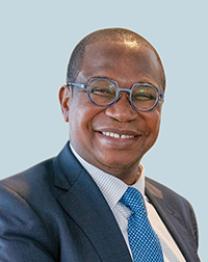
Mthuli Ncube is the Minister of Finance in Zimbabwe. He has a background in academia, banking, investments and public policy.
Before his appointment as Minister of Finance in Zimbabwe in September 2018, he was managing director and head of Quantum Global Research Lab (Switzerland), part of Quantum Global Group, the largest Private Equity group dedicated to investing in Africa.
From 2014 to 2016 Professor Ncube led a multi-disciplinary project on the Economics of HIV (Rethink HIV) project at the Blavatnik School of Government as Professor of Public Policy.
He joined the Blavatnik School from the African Development Bank Group (AfDB), where he was Chief Economist and Vice President. He is ranked as a top economic thinker on Africa and globally.
As Vice President and Chief Economist of the AfDB he led the strategic thinking within the bank on development issues, and directly supervised the development Research, Statistics, and capacity development, general knowledge management, and strategy. He led and guided the development of the Bank’s '10 term Strategy' (2013-2022). He championed the “inclusive growth” agenda that underpins the bank’s long-term strategy, and created an “Inclusive Growth Index” for Africa. He represented the AfDB in external engagements and spokesperson on economic/development issues. He has led policy dialogue activities with governments in Africa and globally.
Professor Ncube holds a PhD in Economics (Mathematical Finance) from the University of Cambridge, Selwyn College, UK, on “Pricing Options under Stochastic Volatility”. He has been the Dean of the Faculty of Commerce Law and Management, and also Dean and Professor of Finance at Wits Business School, all at the University of Witwatersrand, in South Africa. He founded the Centre for Entrepreneurship at Wits University. He was also a Lecturer in Finance at the London School of Economics (LSE).
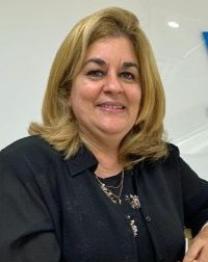
Deborah Rivas Saavedra currently holds the position of Vice Minister of International Trade and Foreign Investment of Cuba.
Prior to her current position, she held a research position at Cubazucar and was president of the Panamericana Corporation, Inc. She has also served in diplomatic positions at the Embassies of Cuba in Mexico and Peru.
Ms. Rivas holds a degree in International Economic Relations from the University of Havana.
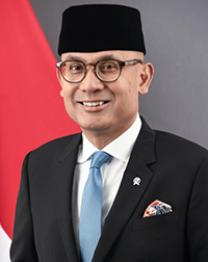
Arrmanatha Christiawan Nasir is an Indonesian diplomat and the current Vice Minister for Foreign Affairs, in office since 21 October 2024.
Nasir was previously the Indonesian Ambassador to the United Nations and the International Seabed Authority in New York, from 2021 to 2024, and the Indonesian Ambassador to the French Republic, Principality of Andorra, Principality of Monaco, and the United Nations Educational, Scientific, and Cultural Organisation (UNESCO) from 2019 to 2021.
From 2014 to 2019, he served as Spokesperson for Indonesia’s Ministry of Foreign Affairs. Between 2008 and 2012, he held the position of Counsellor at the Permanent Mission of Indonesia to the United Nations in New York, where he was responsible for economics and development issues in the General Assembly’s Second Committee (Economic and Financial) and the Economic and Social Council, negotiating for the “Group of 77” developing countries and China on a number of resolutions. From 2010 to 2011, he served as Advisor on economic issues and least developed countries to the President of the sixty-fifth session of the General Assembly.
Among other positions within the Government of Indonesia, Mr. Nasir was Deputy Director for Agriculture and Commodities at the Directorate General of Multilateral Affairs, from 2005 to 2008.
Mr. Nasir earned a master’s degree in international relations from the University of Indonesia; a Master of Business Administration from Leicester University in the United Kingdom; and a bachelor’s degree in economics from the University of Buckingham, also in the United Kingdom.

Ana Isabel Xavier is Secretary of State for Foreign Affairs and Cooperation in the Government of the Portuguese Republic.
Before that, she served as Secretary of State for National Defense (April 2024 to June 2025); Associate Professor at Universidade Autónoma de Lisboa (UAL); Visiting Professor at Iscte – Instituto Universitário de Lisboa; Integrated Researcher at the Centre for International Studies (CEI-Iscte); Researcher at CISD-IUM – Centro de Investigação em Segurança e Defesa of the Portuguese Military University Institute.
She also served as Deputy Director-General for National Defence Policy; President of the Board of the Association of Auditors of National Defence Courses; President of the Board of DECIDE - Association of Young Auditors for Defence, Security and Citizenship.
Ms. Xavier holds a PhD in International Relations from the Faculty of Economics
of the University of Coimbra; a Master's degree in Sociology of Development and Social Transformation (2006) and a degree in International Relations (2003) from the same Faculty.
She also holds a postgraduate degree (2005) in Human Rights and Democratization from the Faculty of Law of the University of Coimbra.
Deemah bint Yahya AlYahya is a Saudi tech diplomat and digital economy expert. In 2021, she was elected as the first Secretary-General of the Digital Cooperation Organization, an inter-governmental organization established in 2020 to work towards a world in which every country, business and person has a fair opportunity to prosper in the global digital economy. She works directly with heads of state, government ministers and digital economy leaders to promote the inclusive development of the digital economy, focusing on global initiatives with real-world impact.
Secretary-General AlYahya has spent nearly 20 years building tech communities in the United States and across the Middle East, acting as a catalyst for innovation and improving the environment for digital entrepreneurs and developers. More than 2.5 million people have benefitted from the ecosystems she has built to distribute the digital economy’s advantages more widely.
A trailblazer for Saudi women in tech, Secretary-General AlYahya began her career as a developer but quickly demonstrated her ability to build public sector centers of innovation from the ground up, among them Saudi Arabia’s National Digital Transformation Unit and the Innovation wing of the MiSK Foundation.
She has served as Chief Innovation Evangelist at Microsoft, responsible for expanding the developer ecosystem and in empowering youth, women and independent software vendors by providing the technology, skills and tools they needed to evolve from job seekers to job creators.
She holds a BA in Computer Science and Information Systems from King Saud University, and has attended senior executive programs with Harvard Business School, and the INSEAD business school.
Angeline Tham is the Founder & CEO of Angkas, and UNCTAD eTrade for Women Advocate for South-East Asia and the Pacific
Angeline Tham is a serial entrepreneur from Singapore who is passionate about solving real-world problems and improving people's lives. She founded Angkas – an online transportation company - in 2016 to address the numerous social impacts of traffic congestion in the Philippines. Tham aspires to be a catalyst for digital transformation in the local and international arenas through her passion for technology and startup development. She wishes to promote innovation by assisting Filipinos with an entrepreneurial mindset and to establish a business ecosystem that encourages collaboration and recognizes creativity and ingenuity in order to benefit the community.
Isabelle is a former prime time news anchor and journalist with more than 20 years experience, she now moderates and MCs at leading forums and summits around the globe.
Isabelle was the lead anchor for Euronews-NBC. She also criss-crossed the planet interviewing heads of state and government, CEOs and celebrities.
Isabelle has moderated at high level and large scale events throughout her career, including the first ever EU Presidential debate, deep dives at the Davos World Economic Forum and the European Commission. Now, this is her principal activity: she works with corporates, international organisations and NGOs on issues relating to all things tech-AI, health, sustainability and more. Today her clients include the European Commission, the UN, WHO, The Consumer Goods Forum, Proctor and Gamble, LEAP and Saatchi and Saatchi.
Isabelle is bilingual in French and English and holds British and German nationality. She is a disability activist, the President of a charity helping people with autism and does pro bono work with the charity Lake Aid helping unaccompanied minors, asylum seekers and homeless families in Annecy, France.



